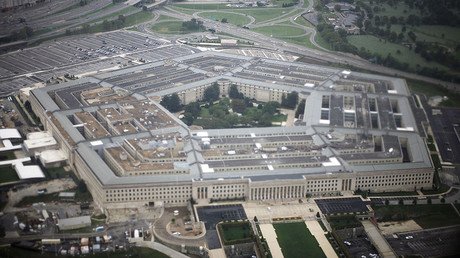‘Bad analysis’: Congress panel blasts military for rosy-eyed ISIS intel
US Central Command intelligence reports provided a “more positive” picture of US efforts against Islamic State than facts on the ground actually supported, claims a new report from a congressional task force led by House Republicans.
The preliminary report, released Thursday, looked into whistleblower allegations that Central Command (CENTCOM) touched up intelligence reports to make US efforts against Islamic State (IS, formerly ISIS/ISIL) in Iraq and Syria appear more effective than it actually was. After interviewing five analysts and several experts, the panel found “persistent problems” with intelligence reports in 2014 and 2015.
The panel argued that in 2014 and 2015, “intelligence products approved by senior CENTCOM leaders typically provided a more positive depiction of US anti-terrorism efforts than was warranted by facts on the ground and were consistently more positive than analysis produced by other elements of the Intelligence Community.”
The Pentagon declined to comment on the report, citing the current investigation into the matter by its own inspector-general.
"We will take no action or make any comment that could appear to influence the IG's work," Pentagon spokesman Lieutenant-Commander Patrick Evans said Thursday.
Rumors that analysts were pressured to doctor intelligence first surfaced in May 2015. By September, two senior analysts at CENTCOM filed a formal complaint with the Pentagon’s inspector-general, which was then endorsed by 50 of their colleagues.
Republican lawmakers in charge of the House Armed Services Committee, the House Permanent Select Committee on Intelligence, and the House Appropriations Subcommittee on Defense, set up the task force to conduct a separate investigation of the charges. The panel is led by representatives Ken Calvert (R-Calif.), Mike Pompeo (R-Kansas) and Brad Wenstrup (R-Ohio).
“The leadership environment within CENTCOM and its Intelligence Directorate deteriorated significantly following the 2013 departure of Marine General James Mattis and his senior intelligence leaders,” the report says, adding that “dozens of analysts viewed the subsequent leadership environment as toxic, with 40 percent of analysts responding that they had experienced an attempt to distort or suppress intelligence in the past year.”
This would put the blame for the problem on the intelligence staff working under the command of Army General Lloyd Austin, who led CENTCOM between March 2013 and March 2016. While the report does not name the officials in question, the Daily Beast – which first reported on the whistleblowing allegations – identified them as Major-General Steven Grove and his civilian deputy, Gregory Ryckman.
“Interviewees explained that senior leadership regularly performed line-in/line-out edits and wording changes which were perceived by analysts as more frequent than previous Intelligence Directorate leadership,” the report said.
I remember all of the chatter for the Mosul op in Spring 2015. JTF report on CENTCOM intel: https://t.co/V3m4ixe57jpic.twitter.com/cXo15t2svY
— Nicholas A. Glavin (@nickglavin) August 11, 2016
As a result, CENTCOM made announcements that did not correspond to reality. For example, statements by Austin and other CENTCOM officials in early 2015 spoke of an imminent Iraqi offensive on IS-held Mosul, which received a lot of play in the US media. The Pentagon had to backpedal the statements, and Mosul remains in IS hands to this day.
In May 2015, just a week after CENTCOM officials said that IS was “on the defense” and “losing ground,” the terror group seized Ramadi with relative ease. It would not be liberated until February 2016, with 80 percent of the city destroyed in the heavy fighting.
The fact that CENTCOM was doctoring intelligence to paint a rosy picture of the battlefield while IS made advances looked bad for the US, “and they had to try to spin this, what was clearly not a success, as a success,” political analyst Dan Glazebrook told RT.
“I think they’ll hope that it’s buried,” Glazebrook said about the report, pointing out that the Obama administration has largely escaped scrutiny over the 2012 Defense Intelligence Agency report that predicted the rise of IS with the blessing of “supporting powers” such as the US, Saudi Arabia and Turkey.
Republican lawmakers are certainly making noise, however. Senator Kelly Ayotte (R-New Hampshire) commented on the report’s release, saying that senior CENTCOM officials “must be held accountable” if they pressured analysts to distort or suppress information “for political or other reasons.”
“A successful strategy to defeat the scourge of radical Islamist terrorism must be based on facts-not rosy assessments manipulated to support a political narrative,” Ayotte said.
“What happened at CENTCOM is unacceptable – our warfighters suffer when bad analysis is presented to senior policymakers. We must continue our efforts until we fix it,” Rep. Calvert said, announcing the report.
The task force’s investigation “remains ongoing” and will parallel the separate probe by the Pentagon’s inspector-general.















